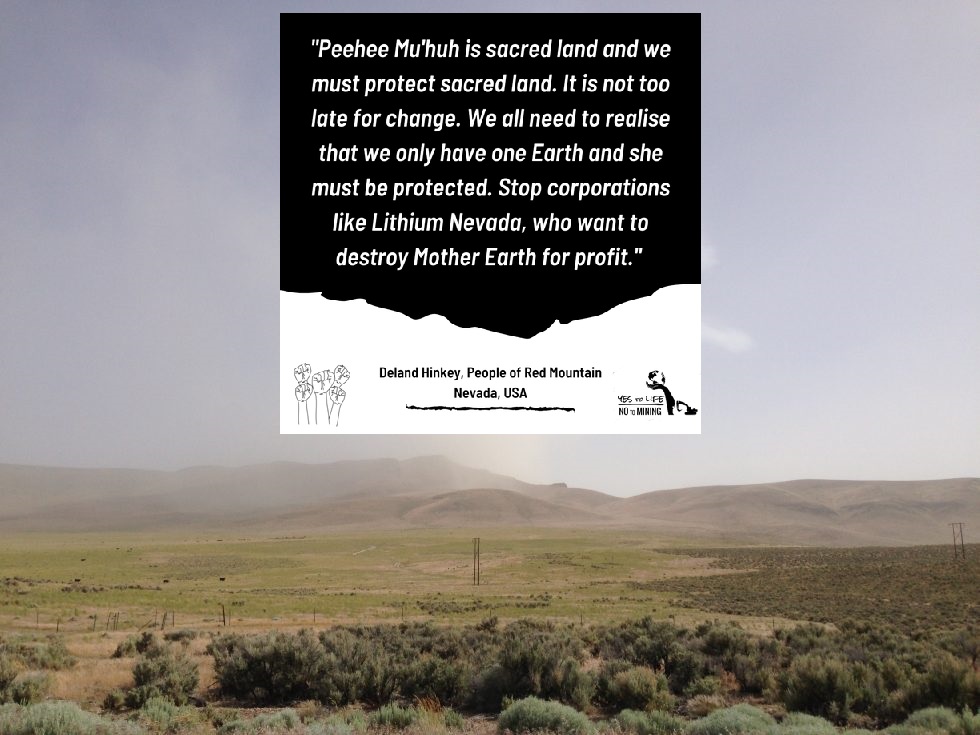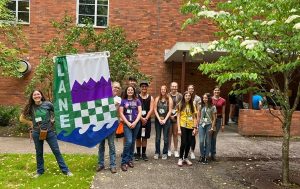Impacted communities expose the stark realities of ‘green energy’ mining boom
4 min read
by Hal Rhoades for the Yes to Life, No to Mining Lithium Network (YLNM)
Sept. 21, 2021 – On World E-mobility and Zero Emissions Day, a global network of communities directly impacted by lithium extraction have warned against drastically expanding mining in the name of green energy. Doing so risks trampling the rights of marginalised peoples and destroying ecosystems that play a vital role in regulating the global climate, they say.
Global corporations currently hold extensive mining rights in south-central Oregon, and current operations at Thacker Pass, Nevada offer a preview of what is to come for Malheur County.
Released to coincide with the 2021 Lithium Supply and Markets Conference in Nevada, USA, a new communique from the Yes to Life, No to Mining Lithium Network lays out the stark realities of the unfolding lithium boom for communities and ecosystems already suffering the impacts of a changing climate.
Deland Hinkey of People of Red Mountain, who are opposing new lithium extraction at Peehee Mu’huh/ Thacker Pass in Nevada, USA, says:
“Peehee Mu’huh is sacred land and we must protect sacred land. It is not too late for change. We all need to realise that we only have one Earth and she must be protected. Stop corporations like Lithium Nevada, who want to destroy Mother Earth for profit. Let’s force corporations to make their carbon footprint smaller. Let’s walk more, buy used and respect the land. Let’s Protect Peehee Mu’huh.”
Signed by representatives of communities from seven nations where lithium mining projects are planned or underway, the communique calls out the greenwashing of an industry that has profound ecological and cultural impacts.
Ramón Morales Balcázar, member of the Observatorio Plurinacional de Salares Andinos – a plurinational network of Indigenous Peoples, peasants, academics and non-governmental organisations in Latin America’s Lithium Triangle, says:
“None of the ongoing or new lithium projects in Chile have been through consultation or proper environmental assessment. Lithium companies refuse to acknowledge that brine is water and don’t understand the real value of Andean Salt flats and wetlands as complex socio-ecosystems. Behind Chilean lithium there’s also corruption at all levels. The situation in Argentina is very similar. This is what extractivism means and as long as this doesn’t change there’s no way we can obtain sustainable lithium in the so-called Lithium Triangle.”
Catarina L. Alves Scarrott of Associação Unidos em Defesa de Covas do Barroso, a local campaign opposing Savannah Resources’ lithium project in Portugal, says:
“There is a lack of transparency and access to timely information in what should be democratic processes. We are up against a government lobby and a propaganda campaign led by the mining company, validated by the government and supported by institutions that ought to be working to protect our basic constitutional rights. At the recent “GreenMining Conference” in Lisbon the mining industry took pride of place. The CEO of Savannah Resources spoke of his good relationship with the community – while the community members were outside protesting against his mine!”
The Communique’s authors assert that we cannot mine our way out of the climate and ecological crisis. They cite the mining industry’s vast carbon footprint, damage to biodiversity and research demonstrating that replacing the global fleet of private vehicles with electric equivalents is the least efficient or just route towards decarbonisation.
Marija Alimpić of Protect Jadar & Rađevinu, a local campaign opposing Rio Tinto’s planned Jadar lithium mine, Serbia, says:
“It is clear, more than ever, that destructive projects like lithium mines masked in the fake green agenda, serve only to satisfy the greed of the rich on the account of Nature and humanity. The local communities on the frontline are usually the Indigenous people whom we should all celebrate for protecting biodiversity for all of us and patiently teaching us real values, such as the necessity of love and respect for Mother Nature and solidarity among humans.”
The first statement of its kind, the YLNM Lithium Communique provides a much needed, progressive vision for the renewable energy transition from the frontlines of resource extraction.
The authors call for a root-and-branch ‘just transformation’ through which emissions reductions are achieved by a massive reduction in the (over)consumption of minerals, metals and other non-renewable materials extracted from the Earth.
In a series of demands, they outline how this transformation can address the existing imbalances in material and energy use between classes, peoples and geographies, in line with the principles of climate justice.
“We need a broad-based, collective movement, informed and deeply respecting of the vast array of diversity we have on this planet, in order to ensure true transformation into a more socially and environmentally just future. A model of energy ’transition’ which violates community and nature’s rights will not deliver us into the global vision and the social and ecological transformation we need to address climate change and deliver climate justice”, write the authors of the Communique.



